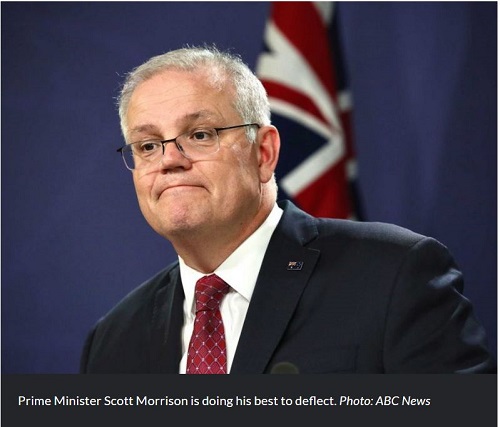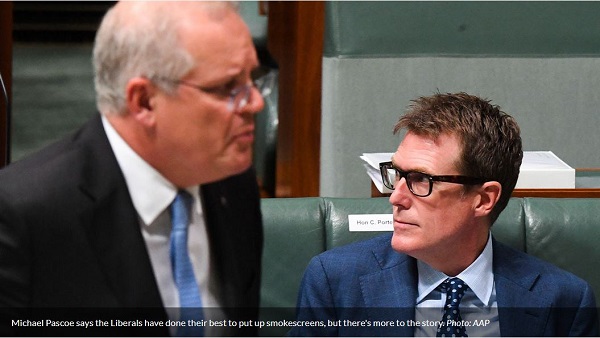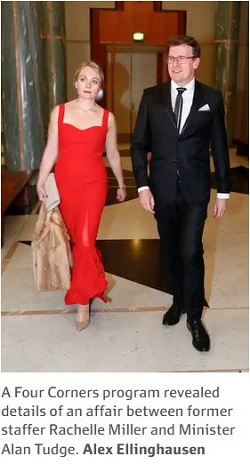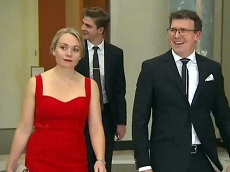Louise Milligan’s Four Corners piece Inside the Canberra Bubble (transcript here) may have had its limitations as a program, but raises important issues as to whether the ‘Canberra Bubble’ is an appropriate and safe working environment, and the ethical appropriateness of the modus operandi of the Morrison Government generally.
Former ALP politician Kate Ellis who has written a book about women, sexism and misogyny in the Australian political landscape was interviewed on ABC RN’s Drive program by Patricia Karvelas – see or hear podcast “Clear power imbalance”: former MP on staffer relationships. Ellis is also quoted in Jennifer Duke’s SMH article ‘It affects all Australians’: Former MP Kate Ellis calls for reform to improve gender equality in Parliament.
Some, notably the Murdoch press, suggested that the ABC should have other things to occupy itself with, rather than poking about on what consenting adults did in their own time, which was their business, plus calls for defunding the ABC (again).
Ellis says, on the contrary, work culture and power imbalances in relationships within the political power bubble was very much a matter of national interest, on the human level, and because politicians were making important decisions about how society functions. Their actions and their decisions should reflect their values:
“I think cultural issues within the Parliament continue because of an under-representation of women and I also think the flow-on effect of the culture within Parliament is that they’re setting the laws [which reflect] what their priorities are and what their values are.
“Respect for women is something we have a lot more work to do on building into the culture.”
She said there needed to be reform, and discussion about what a system could look like to protect staff, both at a departmental level and within each of the parties.
Ellis says staff are more vulnerable than politicians. There should be a framework and pathway to take up issues and find support short of having to make a complaint to Finance, as is the case now.
Finance, it must be said, technically employs ministerial staff, but has a shocking record in looking after them. Finance has no leverage with politicians.
Larissa Waters of The Greens made a similar call for a framework to support staff.
Staffers work long hours to meet the demands of politicians, but lack secure employment and can be terminated on a whim. In practice a formal complaint will almost certainly be career-ending within the bubble.
One of the issues was the sheer hypocrisy of both Tudge and Porter, who were loudly proclaiming family values while personally behaving otherwise.
See:
- Samantha Maiden – Canberra staffer Rachelle Miller reveals affair with Alan Tudge in Four Corners interview
- Michelle Grattan – Sleazebag? Womaniser? Question time has never been quite like this
PM Scott Morrison has made it clear that he believes his predecessor dealt with the issues arising PM won’t sack Christian Porter or Alan Tudge. He believes all pertinent issues were dealt with by his predecessor, who then introduced the ‘bonk ban’, which must not be called such, because we must be serious about these matters. (Morrison interrupted Ann Rushton and ripped into Phillip Coorey for using the term.)

Morrison these days is a performer, says a lot without saying much at all and turns on the emotions at will for effect. Andrew Clark, senior writer for the AFR has one of the better pieces on the whole affair, if it’s not pay-walled in The trouble with the Canberra bubble. He starts:
- It’s a cold, brilliant night as the moon’s reflection beams off the still water of the lake. All seems quiet in the dormitory suburbs of the nation’s capital – unless you happen to chance upon one of those late-night bars frequented by ministers, MPs, politicians’ staff, senior bureaucrats and journalists.
In a bar near Parliament, a minister eyeballs a recently appointed female staff member on another Cabinet minister’s staff. A watchful journalist makes note. The minister’s chief of staff nurses a scotch and a concerned look in the corner. Three young journalists at the other end of the bar swap boasts about “dumps” – deliberately leaked reports. Meanwhile, the music gets louder, the crowd swells and the drinking is frenetic.
Under the heading
Command performance
Clark writes:
- There was a weird echo of these issues on Tuesday in a Parliament House news conference addressed by Morrison and Anne Ruston, the Minister for Families and Social Services. Morrison put on a command performance. He managed, in the space of just a few sentences, to explain that he did not have to do anything about the details broadcast by the ABC because the issue had been dealt with by his predecessor, Turnbull.
The Turnbull “no sex in the office” injunction quickly became known as the “bonk ban”.
For good measure, Morrison then went on to complain that the ABC had not aimed the same editorial blow-torch at the ALP, and effectively accused the media of hypocrisy because of unspecified newsroom behaviour, and lamented the harm that adulterous behaviour has on Australian families.
It seemed like a Morrison tour de force – arguing he didn’t have to do anything, while still taking the moral high ground and throwing mud at his political opponents, the media in general, and the ABC in particular.
However, the optics on the story went pear-shaped for Morrison after Phillip Coorey, The Australian Financial Review’s political editor, asked Ruston about the place of women in Australian politics and the operation of the bonk ban.
Morrison interrupted her just a few words into her response. Video of the exchange went viral, with a reported more than 700,000 views of the incident around the world.
Meanwhile, the headline in The New York Times referred to “Australia’s Struggle With Bonk Bans and Manterruptions”.
Labor senator Penny Wong added helpfully: “Scott, just let her speak.” Others accused the Prime Minister of being “tone-deaf”. After being asked again by Coorey, Ruston said she had felt “wholly supported” during her time in Parliament.
Like Michelle Grattan above, Clark ends by commenting that Christian Porter will never get the keys to the lodge, should Morrison go. One less for Josh Frydenberg to worry about.

That photo heads up Michael Pascoe’s excellent piece Hypocrisy and smokescreens cloud the ‘Canberra Bubble’ drawing on, inter alia, Samantha Maiden’s excellent work on the issue at news.com.au and on Twitter, highlighting the hypocrisy around the issue, the inadequacy of Porter’s response, and assuring Morrison that he has not in fact dealt with the issue.
Pascoe joins Maiden in turning on the media, especially Rupert’s goons at the Oz, pointing out that Rachelle Miller’s may have had a sexual affair which she now regretted, but her complaint was actually about workplace bullying.

- Compare and contrast the immediate absolution the Prime Minister and media pack have granted Alan Tudge with the way allegations were handled about bullying with a whiff of sexuality when the subject was a woman.
Ms Maiden: When you strip away the fact there was a consensual relationship, even if you accept the Prime Minister’s technical argument that essentially this was a relationship that predated the bonk ban, what you’re left with is a formal complaint to the Department of Finance.
So we’re actually in the category here now of Emma Husar. Alan Tudge is in the same position that Emma Husar was in when there were complaints made about her.
We had a situation where the media pursued that relentlessly. She had television cameras out the front of her house with children inside. She had microphones being shoved in the faces of her staff.
I don’t see any of that happening. I have had women this week say to me: “What’s going on with the media? There seems to be some protection racket and everyone is polite and accepts the fact that Alan Tudge put out a statement and that’s the end of it.”
Husar was pretty much cleared by the formal investigation, but was hounded out of parliament while the inquiry was in progress.
Laura Tingle goes to the issue directly in her AFR article It’s still a man’s world in the Coalition’s Canberra (strangely her ABC article had the same title, but has now been softened to The Canberra bubble investigation points to an underlying problem we seem to see over and over again) by quoting Kate Ellis:
- this brings us to another thread of this story, which wasn’t ultimately about the fact Tudge was revealed to have had a consensual affair with one of his staffers (even though there was the splendid hypocrisy of this occurring while he was publicly espousing family values), but about the fact the staffer believes her political career was eventually stymied as she was frozen out of the government after the affair ended.
It is this aspect of women and politics that is at issue here: that there are no ramifications for the blokes involved. But there are for the women.
It is another aspect of a culture where blokes still rule. “Slut shaming” and other forms of bullying are used against women across the political spectrum to damage their advancement and their reputations. We have seen plenty of recent examples, from the politically motivated shaming of former Labor MP Emma Husar, to the bullying of former Liberal MP Julia Banks.
Former Labor minister Kate Ellis tweeted during the week that “women MPs are commonly subject to completely false rumours about their alleged sexual exploits”.
“This is done to undermine them and damage their career progression. Male MPs who actually are regularly getting their pants off do so with rarely any career consequences.”
Now (Monday, yesterday) Louise Milligan tweets that Miller, due to start new job with a Defence contractor, arrived to find they said they “need more time to consider” her contract given media appearance.
Tudge seems to think his apology for sexual misdeeds means there is now no story.
Tingle lines up Porter, who threatened legal action (a form of bullying), claimed he had not snogged a staffer while drunk in the bar, when half a dozen people saw him do it and Tudge went to great lengths to persuade one to delete the photograph, denied having an affair that no-one said he’s had, claimed he’d not been contacted by the ABC when Four Corners executive producer Sally Neighbour they him sent five emails over two weeks setting out the allegations in explicit detail asking 21 specific questions, only one of which he answered on the record.
Deny, deflect, bully.
Tingle says:
-
the underlying problem we seem to see over and over again with this government: its unfamiliarity with the more general idea enshrined in the ministerial code of conduct that “serving the Australian people as Ministers and Assistant Ministers is an honour and comes with expectations to act at all times to the highest possible standards of probity”.
Instead, we have repeated cases of dubiously distributed grants; a lack of accountability about programs like robodebt that go disastrously wrong, with devastating consequences for individual Australians; and a refusal to set up a national integrity system that would hold politicians publicly to account.
(Emphasis added)Tingle told Phillip Adams that the code of conduct carries the signature of one Scott Morrison. Do the words mean anything at all in practice?
Kate Ellis was right, cheat lie and bully the vulnerable in personal life, then do the same in broader policy.
Tingle reminds us that while all this was going on the Government announced:
changes that will see about 2.5 million Australian social security recipients, plus the 1.1 million children they support, receiving $50 less a week to live on as the government winds back its COVID-19 supports.
Seems an essential part of the government’s economic policy to make Australia great again post-Covid is the existence of widespread poverty to motivate the vulnerable and dispossessed.
At Crikey Georgia Wilkins and David Hardaker take a look at Porter’s secret state: how the attorney-general leads the government’s war against accountability. They say:
-
It’s no surprise that Christian Porter has threatened to haul in the lawyers to fight the allegations aired on Monday night’s Four Corners program about his public behaviour with a young female Liberal staffer.
Threatening legal action acts as a deterrent to others who might publish more, and it’s very much in character for a politician with a reputation for seeing transparency and accountability as the enemy.
As attorney-general, Porter has pursued secrecy in all its forms; from appointing political friends to government agencies, to introducing rules that allow him to personally sign off on the prosecution of journalists.
It’s a reputation that stands in stark contrast to the demands of his profession. “Publicity is the soul of justice,” as Porter’s opponent in the Witness K case, lawyer Bernard Collaery, has noted.
But if there’s one other theme that symbolises Porter’s time as Australia’s senior law officer, it’s that there’s one rule for Porter and his colleagues, and another for everyone else.
They then identify nine cases where Porter has acted in a questionable way.
1. With the government’s bungled integrity commission proposal, Porter has managed a remarkable feat: serving up a transparency body that will actually make the government less transparent and, lawyers say, potentially more corrupt.
2. In the case of journalist prosecutions Porter gave himself the power to decide if and when a journalist will be prosecuted for reporting government secrets. What if the journalists are reporting about him?
3. Porter was called in by Morrison to witness a dodgy call Morrison made last year to the NSW police commissioner to discuss a NSW police investigation into Angus Taylor’s attack on Sydney Lord Mayor Clover Moore using false figures.
Porter took no advice on this. Malcolm Turnbull considers the call inappropriate.
4. The Collaery trial:
- Porter has used his national security powers to prosecute Collaery and his client, Witness K, a former intelligence officer turned whistleblower, for their role in exposing Australia’s bugging of East Timor in 2004.
The trial was held in secret.
5. The secret prisoner:
- Porter oversaw the secret prosecution and imprisonment of “Witness J”, a mystery man who was jailed for 15 months and was only discovered when he tried to write a memoir from jail. Not only have the charges and findings been kept secret, but orders covering non-disclosure have not been disclosed.
6. The Administrative Appeals Tribunal:
- Shortly before the 2019 election, Porter announced 86 appointments and reappointments to well-paid roles at the tribunal, including ex-Liberal MPs and former staffers, among them one of Porter’s own advisers who was given a seven-year, full-time AAT position paying up to $245,000 a year.
7. Robodebt
Porter was one of at least five ministers whose fingerprints were on this scam. The others were Morrison, Paul Fletcher, Tudge and Morrison’s bestie Stuart Robert.
As social services minister in 2017, Porter refused to apologise for the scheme in the face of a Senate inquiry which found robodebt had caused trauma, stress and shame to Australia’s most vulnerable.
8. Sports rorts
Porter had dismissed concerns raised by a scathing auditor-general’s report as “not correct”.
9. National security reports:
- Porter has reportedly failed to table crucial reports relating to his use of secretive national security information (NSI) orders. These reports, ironically, provide the only insight into how the government is using its security powers to suppress information in cases like the Collaery trial and the secret imprisonment of Witness J.
Michael Pascoe and David Haraker in a separate article The private/public lives of politicians: are the floodgates about to open? suggest there is more to come, and possibly from Labor.
Now there is an accusation of bullying in Anthony Albanese’s office, which he says is fake.
There is a pay-walled article at the Oz saying a staffer has quit over the issue, so no doubt we’ll hear more.
I’ll finish with some links to stories at the ABC:
- Former prime minister Malcolm Turnbull says he would have given more thought to promoting Christian Porter to Attorney- General if he had known about the extent of the allegations of inappropriate behaviour against him.
The last is by Louise Milligan, Peter Cronau and Lucy Carter. It summarises the program and I think contains additional material from barrister Kathleen Foley, which, together with comments by Sarah Hanson-Young suggest that Porter’s problematic attitude to women remained with him during his time in Canberra.
Will Porter and Tudge will be allowed to move on from here? In ‘Cancel culture’ there is no possibility of restitution. (There is an interesting long-read article by Waleed Aly Woke politics and power in The Monthly looking at the unforgiving nature of cancel culture in the US, how it devastates people personally and has affected the possibility of civil discourse.)
However, their problems are trivial compared to where Rachelle Miller finds herself. Someone should have warned her that whistle-blowers can be unemployable.
Nevertheless, where we find ourselves as a decent functioning democracy is more grave, when Stuart Robert expects praise for ending robodebt, because he “stood in and stopped it”, then paid out $1.23 billion in compensation for what was always an illegal extortion racket targetting the vulnerable.
The Courier Mail today carries an opinion piece by Michael McGuire, asking what a government minister has to do to get the sack. The only instance found is Bridget McKenzie, where wholesale sports rorts grant were business as usual, but not declaring a gun club membership caused her resignation.
In breaking news, Anthony Albanese’s deputy chief of staff Sabina Husic has resigned revealing she “no longer feels safe” in the role after a “cowardly and weak” anonymous dossier was circulated with malicious claims about his office.
She was about to return from mental health leave when the dossier was circulated.
- Earlier, another former staffer in Mr Albanese’s office Fiona Sugden called for a new complaints process for women in Parliament House after allegations emerged that Immigration Minister Alan Tudge had belittled staff including his press secretary Rachelle Williams during an extra marital affair.
Mr Tudge has rejected the bullying allegations as entirely false but apologised for the affair.
“Last week, once again, we saw some incredibly courageous women in the Liberal Party and legal fraternity tell their story. I stand with them. I salute them,” Ms Sugden told the Daily Telegraph.
“It takes great strength to stand up and tell your story when there is enormous pressure to stay silent.
“The culture around the treatment of women at Parliament House does need to change. Men, please listen to us. We are done.”


Having gotten my head into this one, it was hard to give it shape and bring it to some kind of conclusion.
However, climate, too long neglected by me, now calls.
Prof Peter Whiteford explains that Robodebt was a fiasco rather than a policy failure, it was unlawful from the beginning.
The unlawfulness does not relate to a legal technicality or a mistake in drafting, it was a central feature as was foreseeable at the outset.
And as I recall, a mathematically astute son of yours pointed out the chief flaws very early and you summmarised them on this blog.
A long, slow, painful and avoidable fiasco .
Under the public cover of “Cracking Down on Welfare Cheats: What’s Not to Like???”
Ambi, that’s right, my bson has a talent for seeing and expressing things very clearly. But anyone anyone with primary school maths could have seen that they were matching unlike and incompatible data.
The real horror was the reversal of the onus of proof. People were held to owe a debt on the basis of what they computer spewed which by definition could only be correct in rare cases by chance, then they had to pay if they couldn’t prove the government wrong, using employment records that were not easily available.
If they couldn’t prove innocence, the ‘debt’ was handed over to debt collectors with a license to extort.
Yes, Brian
Awful conduct by the Ministers responsible.
Unlawful.
Incompetent.
Predatory.
Thoroughly nasty.
Recently I heard a quip about averages:
The great Don Bradman’s batting average was 99.94. Which of course means that every time he batted, he made exactly 99.94 runs..
Your remark that children with Primary School maths would understand what the central flaw was, in Robodebt, once again demonstrates how important having basic arithmetic and maths is, for every citizen.
Whoops!
From “The Shovel”
In what has been described as an ‘administrative error’, the Federal Court has ordered the Government to pay Robodebt victims $120 billion, instead of the originally agreed amount of $1.2 billion. The Government will be required to pay the higher amount anyway.
When asked to explain how the figures were calculated, a spokesperson for the victims said it was based on complex maths that they wouldn’t understand.
“We’ve used algorithms and big formulas which you don’t need to worry about. Just pay the amount listed on the piece of paper we sent you and all of this will go away”.
When pushed further, the spokesperson explained, “We’ve used an income averaging method, which takes an average of the money owed, multiplies it by ten and then adds a zero. It’s 100% accurate around 8% of the time”.
Oh dear!
I now have Karen Middleton’s article Exclusive: Government refuses to release staff bullying report , which I knew about but didn’t have a link. It’s Saturday Paper, so probably pay-walled.
The federal government is refusing to reveal the results of an investigation into a bullying complaint involving the office of Indigenous Affairs Minister Ken Wyatt, including to the woman who made it.
The Department of Finance has rejected an application from Wyatt’s former chief of staff, Kate Johnson, made under freedom of information laws, for access to a copy of the report into the complaint she made two years ago against Wyatt’s former policy adviser Paula Gelo.
“It is disgraceful that a taxpayer-funded report was kept secret from the people whose lives it affected the most,” Johnson told The Saturday Paper on Thursday.
This is what kicked it off:
Johnson was sacked in 2018, five weeks into her job as Wyatt’s chief of staff, after raising concerns about what she alleges was serious bullying of staff in the office.
Johnson explained her concerns to the office of then prime minister Malcolm Turnbull. Turnbull’s chief of staff telephoned Wyatt to ask about the issue. Wyatt fired her on the spot. Turnbull was ousted and replaced by Scott Morrison 11 days later.
A week after that, Johnson discovered Finance was not investigating her complaint, despite Wyatt saying publicly that he had referred the issue himself.
Kate Johnson then made a formal complaint, at the request of the department, which triggered the investigation.
It turns out Wyatt said he had forwarded the complaint, but he only rang Finance and didn’t.
The investigation was done on a contract to an outside firm which was paid $37,000. Wyatt has the report, says the matter has been dealt with, but no, she can’t see the report.
Josh Bornstein at Blackburn Lawyers says he thinks that’s “complete bullshit”, she can, but obviously you’d have to take them to court to prove he’s right.
In any case the whole setup is clearly complete bullshit and Morrison should fix it if he actually cares as much as he says he does.